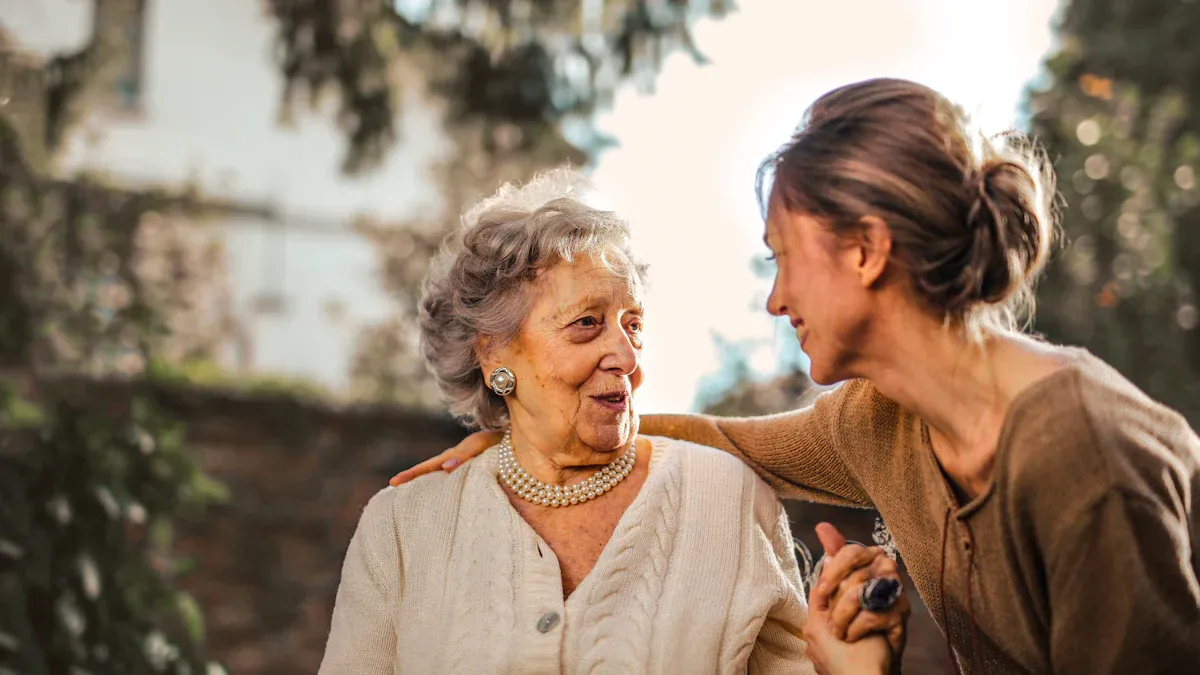Why Caregiver Support Groups Are Vital for Mental Health

Caring for a loved one can feel overwhelming, but you don’t have to face it alone. Joining a caregiver support group can transform your journey. These groups offer a safe space where you can share your struggles, connect with others, and find practical solutions. Studies show that caregivers in support programs often experience improved mental health and a stronger sense of community. For example:
Research from New York University found that caregivers in support groups delayed nursing home placement for Alzheimer’s patients by an average of one and a half years.
The REACH II study revealed that these programs enhance caregivers’ quality of life.
Support groups reduce loneliness, fostering connections that uplift your mental well-being.
The importance of support groups for caregivers lies in their ability to provide relief, encouragement, and tools to help you thrive.
Key Takeaways
Caregiver support groups help you feel better and less alone. Talking to others who understand can boost your mental health.
Being in a support group can make life easier. Studies show caregivers feel stronger and happier by sharing experiences.
Support groups give helpful tips and tools. You can learn new caregiving ideas and find local services to help you.
Picking the right support group is important. Try different groups to find one that fits your needs and makes you feel welcome.
Start today by looking for local or online caregiver groups. You deserve a group that helps and supports you in caring for others.
The Importance of Support Groups for Caregivers

Addressing Emotional Strain
Coping with stress and burnout
Caregiving can feel like an endless cycle of responsibilities. You may often find yourself overwhelmed, leading to stress and burnout. Support groups provide a safe space where you can share your challenges and feel understood. These groups remind you that you are not alone in this journey. Studies show that caregiver support programs significantly improve mental health and reduce emotional strain.
Study | Findings | Impact |
|---|---|---|
REACH II | Caregiver support programs lead to improved quality of life | Decrease in emotional strain |
New York University | Support programs can delay nursing home placement by an average of 1.5 years | Enhanced caregiver mental health |
Building emotional resilience
Support groups help you build emotional resilience by offering encouragement and practical advice. Listening to others’ stories can inspire you to face your own challenges with renewed strength. These groups foster a sense of hope, helping you navigate the ups and downs of caregiving with confidence.
Combating Social Isolation
Creating a sense of belonging
Caregiving can sometimes feel isolating, but support groups create a sense of belonging. You connect with others who truly understand your experiences. This connection combats loneliness and helps you feel part of a supportive community.
Caregiver support groups improve caregivers' mental health.
They combat feelings of loneliness and isolation, fostering social connections.
Support groups enhance the overall quality of life for both caregivers and those they care for.
Strengthening social connections
By joining a support group, you strengthen your social connections. These relationships provide emotional support and practical advice, making your caregiving journey less overwhelming. You’ll find that sharing your experiences with others can be incredibly uplifting.
Managing Practical Challenges
Balancing caregiving and personal responsibilities
Balancing caregiving with your personal life can be challenging. Support groups offer strategies to help you manage your time effectively. You’ll learn how to prioritize tasks and set boundaries, ensuring you don’t neglect your own needs.
Accessing financial and logistical support
Many caregivers struggle with financial and logistical challenges. Support groups can guide you to resources that ease these burdens. For example, research shows that these groups can delay nursing home placement for individuals requiring care, allowing you to manage caregiving at home for longer.
Research from New York University indicates that caregiver support groups can significantly delay nursing home placement for individuals requiring care.
Specifically, these programs can extend the time patients with Alzheimer's disease remain at home by an average of one and a half years.
Benefits of Caregiver Support Groups
Emotional and Mental Health Benefits
Sharing experiences and finding comfort
Caregiver support groups provide a unique opportunity for you to share your experiences with others who truly understand your journey. Talking about your challenges can bring immense relief and comfort. Hearing others’ stories can also remind you that you’re not alone. These groups create a safe space where you can express your emotions without fear of judgment.
Research from the REACH II program highlights that caregiver support groups significantly improve the quality of life for caregivers, especially those caring for individuals with Alzheimer’s disease.
Participants in these programs reported noticeable improvements in their well-being after six months, with Hispanic caregivers showing a 45% improvement, White caregivers 40%, and African American caregivers 28%.
Reducing feelings of loneliness and isolation
Caregiving can sometimes feel isolating, but support groups help you build meaningful connections. By joining these groups, you can combat loneliness and foster a sense of belonging. Studies show that these connections positively impact your mental health.
The REACH II study found that caregiver support groups enhance social connections, reducing feelings of loneliness.
These groups also help caregivers delay nursing home placement for loved ones, improving both care quality and mental health.
Practical Resources and Advice
Learning caregiving strategies and tools
Support groups are a treasure trove of practical advice. You can learn caregiving strategies and tools that make your responsibilities more manageable. Members often share tips and techniques that have worked for them, helping you feel more confident in your role.
Caregiver support groups provide essential information, legal guidance, and practical assistance.
Evaluations show high satisfaction among participants, who report feeling more competent and prepared after attending these groups.
Discovering community resources and services
Navigating caregiving can be overwhelming, but support groups can guide you to valuable community resources. These include financial assistance programs, respite care options, and local services tailored to caregivers. By tapping into these resources, you can ease your caregiving burden and focus on what matters most.
Building a Supportive Community
Fostering peer connections
Support groups foster a sense of camaraderie among caregivers. You’ll meet others who share similar experiences, creating a network of peers who understand your challenges. These connections can provide emotional support and practical advice, making your caregiving journey less daunting.
Caregiver Ethnicity | Improvement Percentage |
|---|---|
Hispanic | 45% |
White | 40% |
African American | 28% |
Control Group | 7% (Hispanic), 13% (White), 11% (African American) |
Encouraging mutual understanding and empathy
In a support group, you’ll find a space filled with empathy and understanding. Members listen to each other’s stories, offering encouragement and advice. This mutual support creates a positive environment where you can grow emotionally and mentally.
“Caregiver support groups are not just about sharing struggles; they’re about building resilience and finding hope together.”
Types of Caregiver Support Groups

Peer-Led Support Groups
Benefits of shared experiences
Peer-led support groups bring together caregivers who share similar challenges. These groups thrive on shared experiences, creating a space where you can connect with others who truly understand your journey. Listening to their stories can inspire you and provide practical insights for your caregiving role.
Caregivers in these groups often report improved emotional health.
They can delay nursing home placement for loved ones by an average of 1.5 years.
This delay reflects better care quality and reduced stress for caregivers.
By joining a peer-led group, you gain emotional relief and a sense of camaraderie. These benefits can make your caregiving experience more manageable and fulfilling.
Examples of local and community-based groups
Local and community-based support groups are often organized by nonprofit organizations, churches, or community centers. These groups meet in person, offering a chance to build deeper connections. You might find groups tailored to specific caregiving needs, such as Alzheimer’s or cancer care. Check with your local healthcare providers or community bulletin boards to discover options near you.
Online Support Groups
Accessibility and flexibility of virtual platforms
Online support groups offer unmatched convenience. You can join from the comfort of your home, making them ideal if you have a busy schedule or limited mobility. Virtual platforms allow you to connect with caregivers worldwide, broadening your support network.
💡 Tip: Many online groups operate 24/7, so you can find support whenever you need it most.
Popular online forums and social media groups
Social media platforms like Facebook host numerous caregiver groups. Forums such as AgingCare and The Caregiver Space also provide dedicated spaces for sharing advice and encouragement. These online communities are rich with resources and offer a safe environment to express your thoughts.
Professional-Led Support Groups
Expert guidance from therapists or counselors
Professional-led support groups are facilitated by trained therapists or counselors. These experts guide discussions, ensuring you receive targeted advice and emotional support. If you’re dealing with complex caregiving challenges, these groups can help you navigate them with confidence.
Structured sessions for targeted support
These groups often follow a structured format, focusing on specific topics like stress management or coping strategies. You’ll leave each session with actionable insights to improve your caregiving experience. Professional-led groups are especially beneficial if you’re seeking a more formal approach to support.
How to Find and Join Caregiver Support Groups
Exploring Local Options
Contacting healthcare providers and community centers
Start your search by reaching out to local healthcare providers or community centers. These organizations often have information about caregiver support groups in your area. Hospitals, clinics, and senior care facilities frequently host or recommend groups tailored to specific caregiving needs. Community centers may also organize regular meetings where you can connect with others facing similar challenges.
💡 Tip: Ask your doctor or social worker for recommendations. They can guide you to groups that align with your caregiving situation.
Researching nonprofit organizations
Nonprofit organizations dedicated to caregiving or specific health conditions are excellent resources. Groups like the Alzheimer’s Association or the American Cancer Society often run support programs for caregivers. These organizations provide not only emotional support but also practical tools and resources to help you manage your caregiving responsibilities.
Leveraging Online Platforms
Searching for virtual groups tailored to caregivers
Online platforms make it easy to find support groups that fit your schedule and needs. Search for virtual groups that focus on your caregiving role, whether it’s for aging parents, children with special needs, or loved ones with chronic illnesses. Many websites and apps allow you to join discussions, attend webinars, or participate in live sessions from the comfort of your home.
🌐 Note: Websites like AgingCare and Caregiver Action Network offer directories of online support groups.
Joining specialized caregiving forums
Specialized forums and social media groups provide a space to share experiences and seek advice. Platforms like Facebook host private groups where caregivers discuss challenges and solutions. These forums often include members from diverse backgrounds, offering a wealth of perspectives and ideas.
Choosing the Right Group
Assessing compatibility and focus
Finding the right group involves assessing its focus and how well it aligns with your needs. Look for groups that offer:
Practical assistance to improve your caregiving skills.
Community connection to foster a sense of belonging.
Resources like legal guidance and coping strategies.
Trying different groups to find the best fit
Don’t hesitate to explore multiple groups before settling on one. Attend a few sessions to see if the group’s atmosphere and approach resonate with you. The right group will make you feel supported, understood, and empowered to handle your caregiving journey.
“The perfect support group is one where you feel heard, valued, and equipped to thrive.”
Caregiver support groups empower you to overcome emotional, social, and practical challenges. They offer a lifeline of encouragement, connection, and resources that can transform your caregiving experience.
Why join a support group?
Improve your mental health.
Build emotional resilience.
Access tools and advice to thrive.
💡 Take Action: Explore local or online groups today. Find one that aligns with your needs and helps you feel supported.
You deserve a community that uplifts you. Take the first step toward a brighter caregiving journey.
FAQ
What are caregiver support groups?
Caregiver support groups are safe spaces where you can connect with others who share similar caregiving experiences. These groups provide emotional support, practical advice, and a sense of community. They help you navigate the challenges of caregiving while improving your mental health and overall well-being.
How do I know if a support group is right for me?
Look for a group that aligns with your caregiving needs and personal preferences. Attend a few sessions to see if the atmosphere feels supportive. The right group will make you feel understood, valued, and empowered to handle your caregiving journey.
💡 Tip: Trust your instincts. If it feels right, it probably is!
Can I join a support group if I’m new to caregiving?
Absolutely! Support groups welcome caregivers at all stages. Whether you’re just starting or have years of experience, you’ll find valuable insights and encouragement. Sharing your journey and learning from others can make your transition into caregiving smoother and less overwhelming.
Are online support groups as effective as in-person ones?
Yes, online groups offer flexibility and accessibility. You can connect with caregivers worldwide, share experiences, and access resources anytime. While in-person groups provide face-to-face interaction, online platforms ensure you never feel alone, even with a busy schedule.
🌐 Note: Many online groups operate 24/7, offering support whenever you need it.
What if I don’t feel comfortable sharing in a group?
It’s okay to take your time. Many caregivers start by listening before opening up. Support groups are judgment-free zones where you can share at your own pace. Over time, you’ll likely feel more comfortable and find strength in connecting with others.
💬 Reminder: Your voice matters, but it’s okay to start small.
See Also
Exploring Symptoms And Treatment Options For Conjunctival Melanoma
An Overview Of Carcinoid Syndrome And Its Symptoms
Recognizing Symptoms And Treatment Approaches For Choroid Plexus Carcinoma
Insights Into Symptoms And Treatments Of Adrenocortical Adenoma

